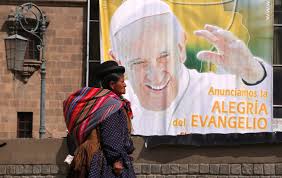
Is My Faith Merely a Cultural Expression?
As American priests in Bolivia in the 1970s, my colleagues and I tried to overcome the cultural differences between the Aymara people with whom we worked and the cultural baggage of the western Church.
We wore Aymara-made vestments for Mass – the heavy, hand-made, colorful ponchos that kept people warm in the cold of the Altiplano. We sang hymns composed by Aymaras set to the woeful music of the Andes. We conducted masses in Aymara, even though none of us were fluent in the language.
But we barely made a dent in the cultural differences because they were so many and so great. It made you realize how much we in the western Church are influenced by our culture and how hard it is to separate it from religion.
Much more effective is the work of people like Engelbert Mveng, a Jesuit priest from the west-central African nation of Cameroon who experienced first-hand the importance of culture in understanding the true nature of religion – of Christianity, at least.
A Unique Theological Voice
Mveng studied in Belgium and France before returning to his homeland following his ordination in 1963, according to the daily prayer book, Give Us This Day. “Drawing on his African cultural roots, Mveng developed a unique theological voice, combining art, anthropology, and history.
“Mveng was a key promoter of enculturation – the incarnation of the Gospel into the language, culture, and worldview of the African peoples. Through this ‘de-Europeanizing’ of the Gospel, the African Church not only found its own voice but contributed to making the Church more truly ‘Catholic.’”
Art was one of his major tools. The online Dictionary of African Christian Biography says that “…in a manner that was hitherto unprecedented, he used art to express Africa’s deepest spiritual insights into universal Christian phenomena.”
Brutally Murdered
Mveng was brutally murdered by an unknown assailant on the night of April 22, 1995 in Yaounde, Cameroon.
I often think about how many of us view the version of Christianity practiced in the western world as normative and definitive. Of the world’s population, an estimated one-third – a plurality – claim Christianity. But that leaves an estimated two-thirds practicing another religion or claiming none.
In our search for God, how do we reconcile what we believe and practice with this vast throng of people who connect with God in an entirely different way, or who apparently don’t connect with him at all? Is my faith merely an expression of culture?
Jesus was deeply entrenched in his culture. Not only was he a Jew but a rabbi highly educated in the ancient Jewish texts. Seemingly bowing to pressure from his disciples to send away a Canaanite woman who sought healing for her daughter, he once told an audience that he was sent “only to the lost sheep of Israel,” adding that it “wasn’t right to “take the children’s bread and toss it to the dogs.”
That reflected the contempt many Jews had for the pagan gods of their time, especially the fertility gods of Canaan. But seeing the woman more clearly as a human being and appreciating her faith, he changed his mind. You could say that it was a learning experience for Jesus.
“Great is your faith …,” he said. “Be it done for you as you desire. And her daughter was healed instantly.”
Not of This Fold
In the Gospel of John, this acquired appreciation for the religious needs of non-Jews was obvious. In a passage in which he describes himself as “the Good Shepherd,” Jesus says he has “other sheep that are not of this fold; I must bring them also, and they will heed my voice.”
I inherited my faith from my parents, grandparents and ancestors – God’s way of relating to me, my family and much of my culture. But it isn’t like inheriting an antique dining set. I have to make it my own, nurture it and grow in understanding it, and be faithful to it just as Muslims, Buddhists and Hindus do in their response to God.
Yes, my faith is partly a cultural expression, but it’s much more than that. And that’s one of the many valuable things I learned from the Aymara people.

